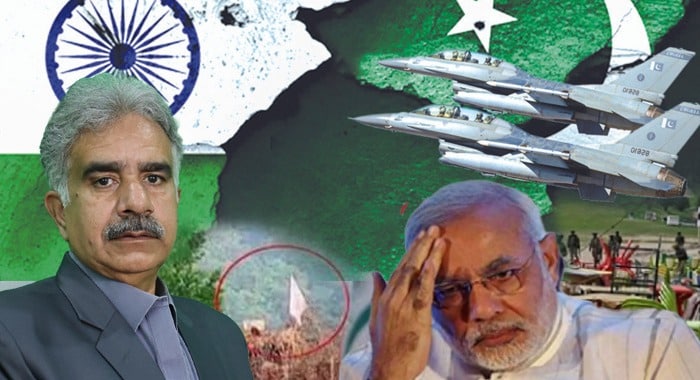Ever since the Pahalgam incident, India has been constructing a narrative following what appears to be a false flag operation—one designed to internationally isolate and discredit Pakistan. India’s engagement with the international community seemed to hint at an imminent attack, although its targets remained unclear.
Now, that attack has occurred. Strikes were carried out not just along the Line of Control (LoC), but also deep into Pakistani Punjab. Indian officials claim that these attacks targeted alleged terrorist hideouts, such as those belonging to Jaish-e-Muhammad, Lashkar-e-Taiba, or Hizb-ul-Mujahideen. However, the reality on the ground paints a different picture: mosques were targeted, and innocent civilians—including women and children—lost their lives.
India’s aggression, driven by the RSS-Modi ideology, exposes not just anti-Muslim sentiment but a broader extremist vision. This vision insists that every citizen in India should conform to Hinduism—an ideology that directly contradicts the country’s secular constitution. The recent strikes, and the targeting of religious sites, not only violate international norms but lay bare the extremism festering within India’s political leadership.
The purpose of this operation was clear: to cover up India’s intelligence and policy failures in Kashmir by fabricating yet another false flag incident. But rather than isolating Pakistan, the outcome has humiliated India. Pakistan’s prompt and effective military response—including the downing of Rafale and MiG jets—exposed India’s vulnerabilities. According to Pakistan’s defence officials, Indian troops fled their posts, and many were captured. The world watched as India waved white flags to retrieve its dead—an image impossible to hide in today’s age of instant media.
In contrast, Pakistan’s strikes were targeted exclusively at Indian military positions. Videos of downed jets surfaced within hours, confirming Pakistan’s claims and disproving Indian propaganda. India, having spent billions on Rafale jets touted as ‘super weapons,’ was unable to prevent their destruction—even failing to penetrate Pakistani airspace effectively.
The attack on civilian populations, including places of worship, stands in violation of the rules of war. Pakistan, in stark contrast, demonstrated restraint and professionalism—targeting only military assets. Despite its effectiveness, Pakistan’s response was non-escalatory, reinforcing its message: “We do not want war, but we will defend ourselves decisively if provoked.”
The United States, though motivated by its own interests, publicly called the attack “shameful”—an implicit acknowledgement that India’s actions were unjustified. The Modi administration, needing to justify massive defence spending to its own people, dubbed the attack “Operation Sindoor,” claiming it avenged the widows of slain soldiers. In reality, it only deepened India’s disgrace by killing children and civilians while losing billion-dollar jets in return.
India’s dream of military supremacy lies shattered. The myth of its air force superiority and powerful artillery has been debunked. Pakistan not only shot down Indian aircraft but did so within Indian airspace. This message is loud and clear: Pakistan may be smaller, but its defence capabilities are formidable.
One must also ask: why was there no earlier response from global institutions? Pakistan repeatedly called for independent investigations into incidents like the Jaffar Express attack, but no solid steps were taken. Will the world compensate the families of Pakistani civilians who were targeted? Will India be held accountable?
India’s aggression has ignited internal dissent as well. Many within India are questioning Modi’s extremist policies, which are isolating minorities. Muslims, Christians, Dalits, and even Sikhs are increasingly marginalised. The social fabric of India is unravelling—what was once integrated is now segregated. If this trajectory continues, India may be headed toward disintegration, with powerful separatist movements like Khalistan gaining traction.
India’s attempts to create a Zionist-style Hindu supremacist state—mirroring the occupation model in Palestine—should alarm the global community. If the world expects Pakistan to exercise restraint, it must demand accountability from India. Independent investigations must be accepted, compensation for victims must be addressed, and Kashmiris must be granted their right to self-determination.
Regionally, India’s foreign policy has backfired. Its influence in Bangladesh, Nepal, and Sri Lanka is waning. Its attempt to align with the Kabul regime has distanced it from Western neighbours. Pakistan, on the other hand, has achieved significant diplomatic wins: Iran and Turkey—once closer to India in trade—have condemned India’s actions. Most importantly, China has openly declared its unwavering support for Pakistan’s sovereignty.
This moment marks a strategic realignment. Emerging blocs—including Pakistan, Russia, Iran, Turkey, Central Asian states, and even nations like Bangladesh and Nepal—are moving together, while India is seen gravitating into the lap of the U.S., positioning itself as a front-line state against China and Russia.
For Pakistan, this presents an opportunity to strengthen its economy, defence, and diplomacy. But most critically, it must remain firm on Kashmir. No compromise should be made—neither on Kashmir, nor on the Indus Waters Treaty, nor on Pakistan’s sovereignty. If the international community truly wants peace, it must uphold justice. Otherwise, Pakistan has every right—and the capability—to respond.
And respond it will.





